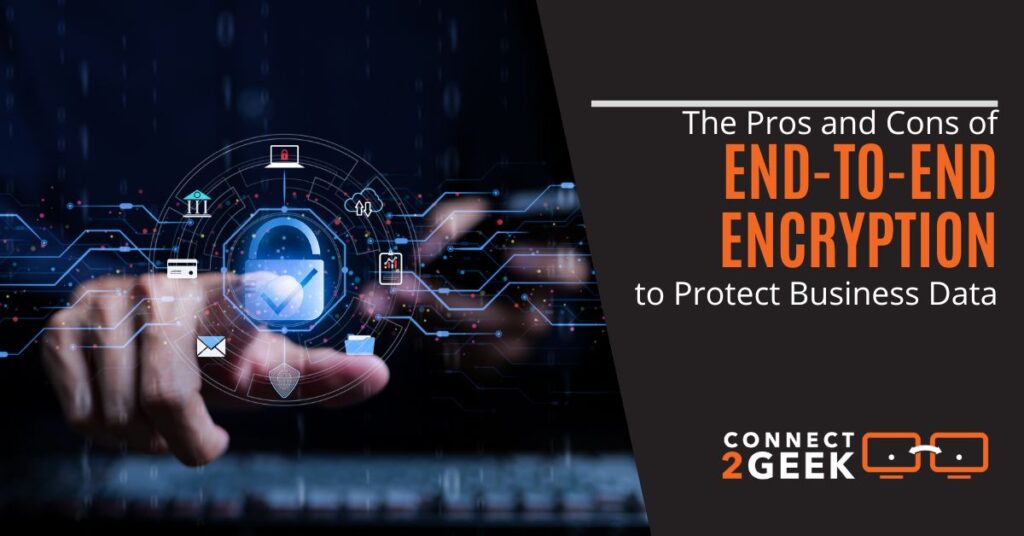
In today’s fast-paced digital landscape, where information is transmitted and stored across various platforms, ensuring data security has become paramount for businesses. One of the most effective methods to safeguard sensitive information from unauthorized access is through the implementation of end-to-end encryption.
This powerful technique ensures that only intended recipients can decode transmitted data, thereby providing a robust shield against interception and potential breaches. However, like any technological solution, end-to-end encryption comes with its own set of advantages and disadvantages. In this article, we will delve into the pros and cons of end-to-end encryption in protecting business data.
Understanding End-To-End Encryption
End-to-end encryption is a security protocol that encodes data in such a way that it can only be read by its intended recipient. This means that even if a malicious actor intercepts the communication or gains access to the data, they would not be able to decipher its contents without the encryption key possessed only by the authorized recipient. This advanced level of encryption ensures the confidentiality and integrity of sensitive data during transmission and storage.
Pros of End-To-End Encryption
Data Confidentiality
The primary advantage of end-to-end encryption is its ability to keep sensitive data hidden from prying eyes. Whether it’s financial transactions, confidential contracts, or personal customer information, this encryption ensures that the information remains confidential and inaccessible to unauthorized entities.
Mitigation of Threats
End-to-end encryption significantly reduces the risk of data breaches during transmission. Even if an attacker manages to intercept the data, they would be unable to decipher its content without the encryption key, rendering the intercepted information useless.
Compliance
In an era where data protection regulations such as GDPR and HIPAA are stringent, end-to-end encryption helps businesses meet their compliance requirements. By securing data both in transit and at rest, companies can avoid hefty fines and maintain their reputation.
Securing Cloud Data
Cloud storage has become a staple for businesses to store and access data remotely. End-to-end encryption adds an extra layer of security, ensuring that data stored in the cloud remains encrypted and protected from potential breaches.
Protection against Insider Threats
Not all security breaches come from external sources. End-to-end encryption guards against internal misuse of data, ensuring that even employees with access to the data cannot decipher its contents without the appropriate encryption keys.
Cons of End-To-End Encryption
Key Management Challenges
The encryption’s effectiveness relies on the proper management of encryption keys. Lost or forgotten keys can lead to irreversible data loss, emphasizing the importance of robust key management strategies.
Impact on Search and Analysis
Encrypted data is inherently challenging to analyze. Enterprises that rely on data analysis for insights may find that end-to-end encryption adds complexity to search and analysis processes, potentially hindering decision-making.
Communication Complexity
Different encryption methods can complicate communication between systems that use varied encryption protocols. This complexity might require additional resources and time to integrate and maintain encryption compatibility.
No Safety Net for Forgotten Keys
While encryption ensures security, it also means that if encryption keys are lost or forgotten, the encrypted data becomes permanently inaccessible. This aspect underscores the need for meticulous key management.
Potential for Misuse
As with any powerful tool, there’s a potential for misuse. Criminal elements can exploit end-to-end encryption for illicit activities, making it a concern for law enforcement agencies seeking to prevent and investigate crimes.
Is End-To-End Encryption Right for Your Business?
Whether end-to-end encryption is the right choice for your business depends on various factors. While the advantages are clear, it’s important to consider the specific needs and challenges of your organization.
- Sensitive Data: If your business deals with highly sensitive information, such as personal health records or financial data, end-to-end encryption provides an additional layer of protection that’s hard to match with other methods.
- Collaboration and Communication: If your business heavily relies on collaborative work and secure communication, the benefits of end-to-end encryption can significantly outweigh the challenges.
- Compliance Requirements: Industries subject to strict data protection regulations will find that implementing end-to-end encryption aligns well with compliance goals.
- Usability: Consider the technical proficiency of your employees and partners. If the encryption process is overly complex, it might lead to frustration and errors.
- Balancing Security and Convenience: While strong encryption enhances security, it can also add extra steps and complexity to certain processes. Evaluate whether the trade-off between security and convenience is acceptable for your organization.
Making an Informed Decision
End-to-end encryption stands as a powerful tool in the arsenal of data protection strategies. Its ability to secure communication, mitigate threats, and ensure compliance makes it an attractive choice for many businesses. However, the challenges related to key management, usability, and potential misuse should not be overlooked.
As you evaluate whether end-to-end encryption is the right fit for your business, consider the nature of your data, the level of collaboration required, and your industry’s compliance demands. By striking the right balance between security and usability, you can harness the benefits of end-to-end encryption without falling victim to its potential downsides.
If you’re seeking guidance on implementing end-to-end encryption or other data security solutions, Connect2Geek is here to help. With our expertise in IT solutions and cybersecurity, we can assist you in making informed decisions to safeguard your business data effectively. Your data security is our priority.
